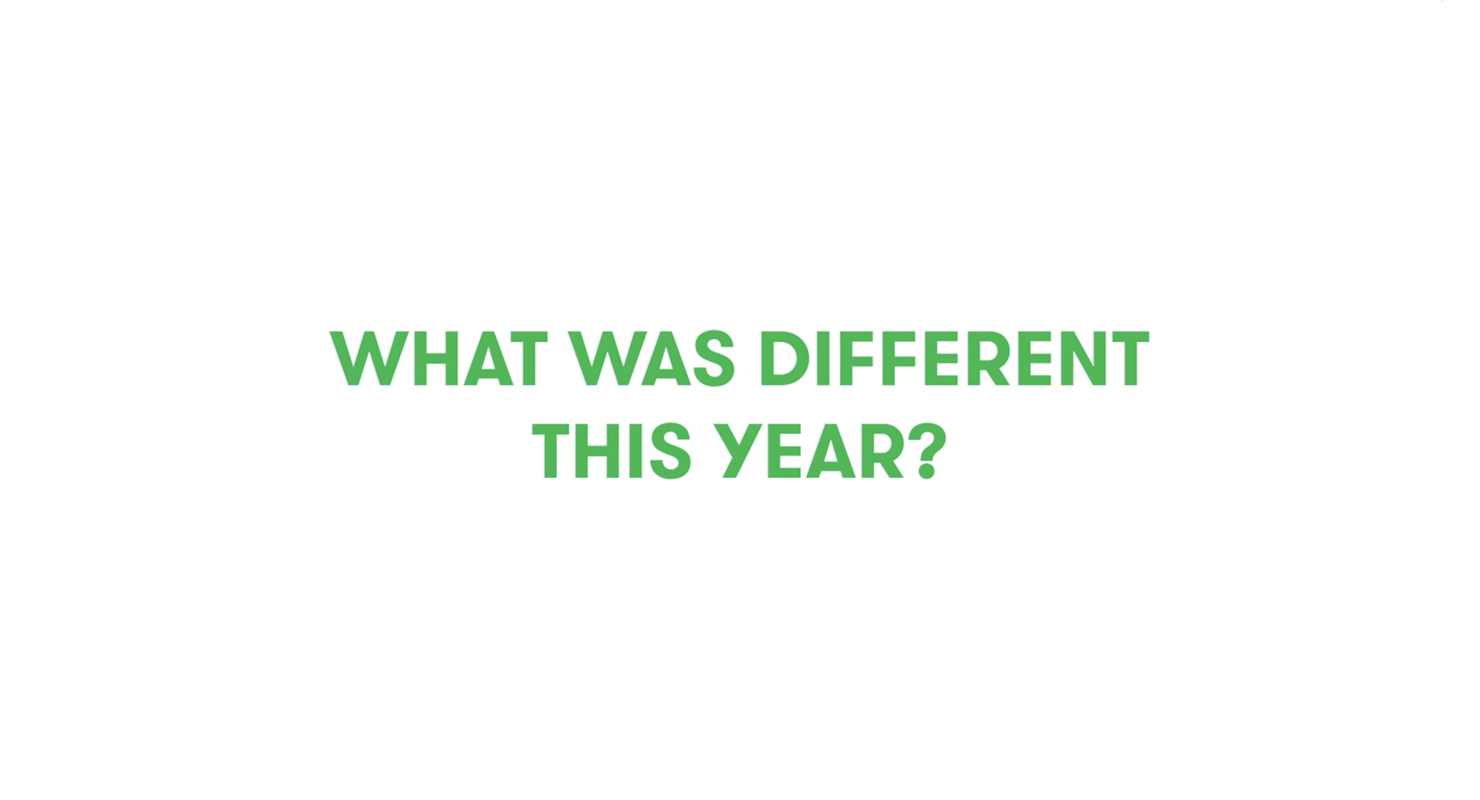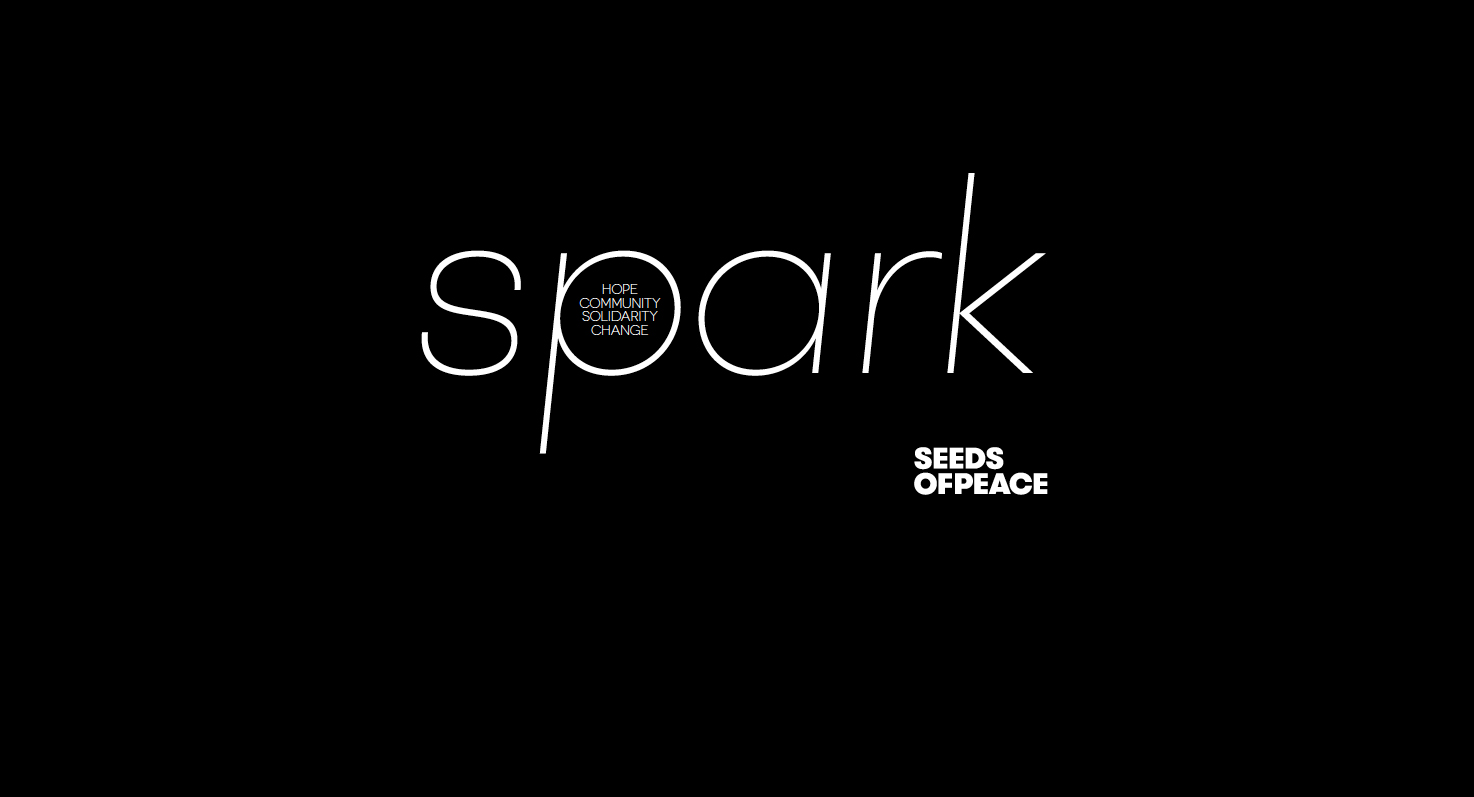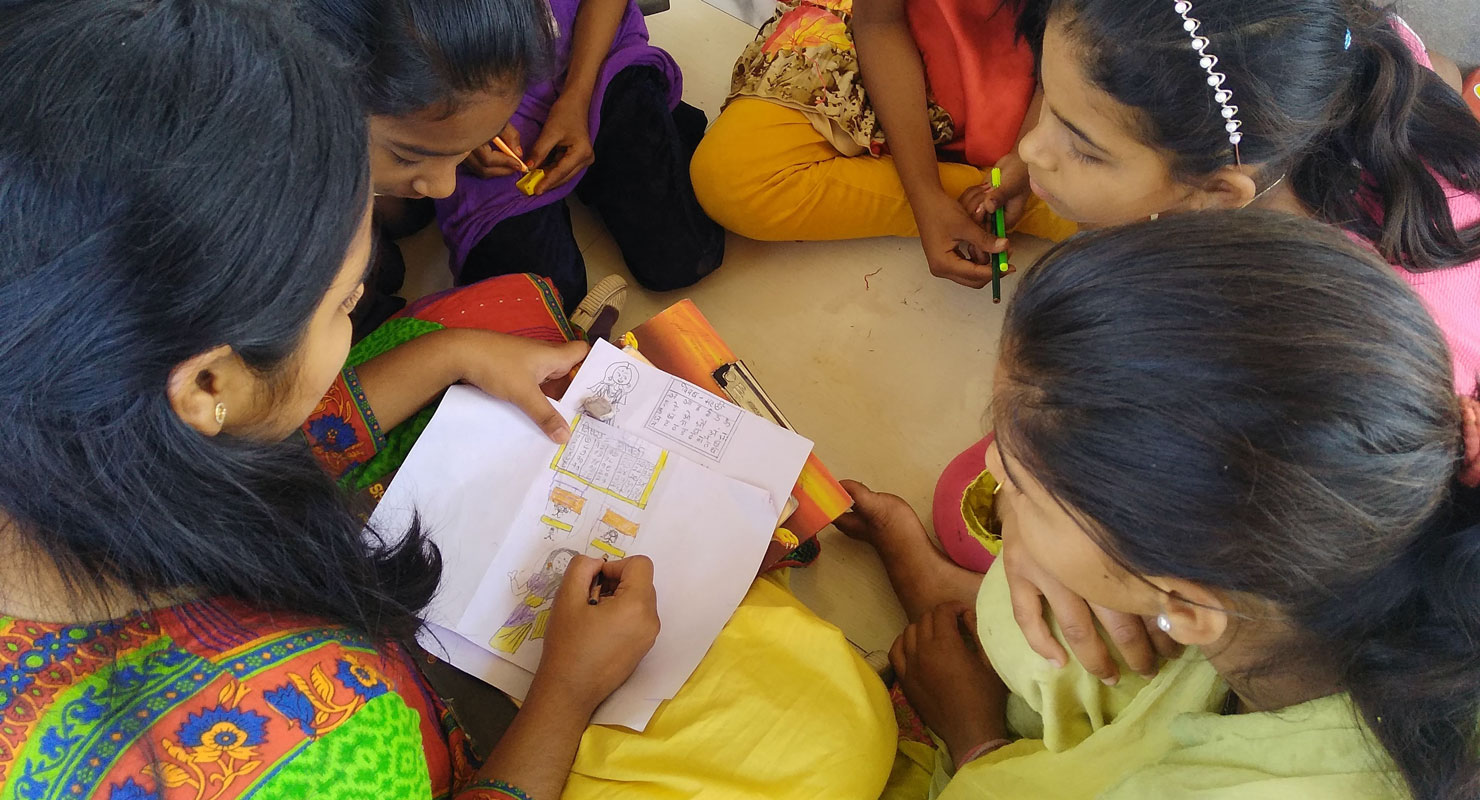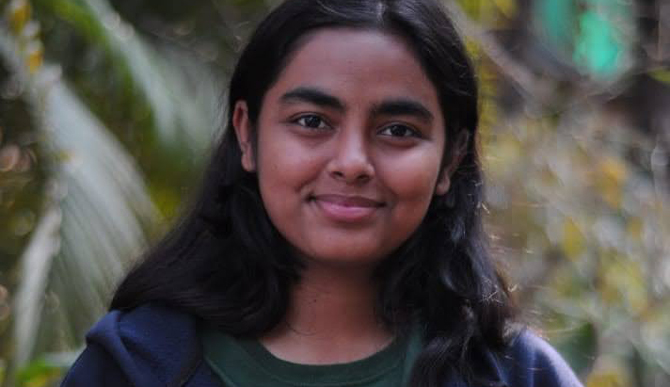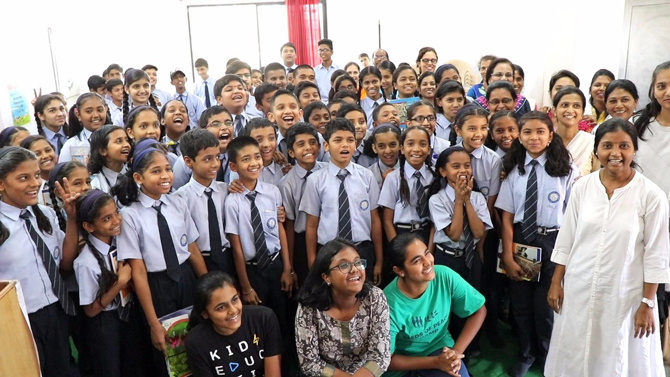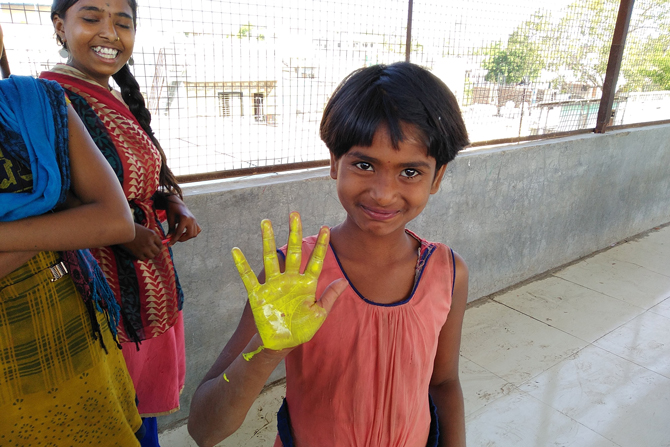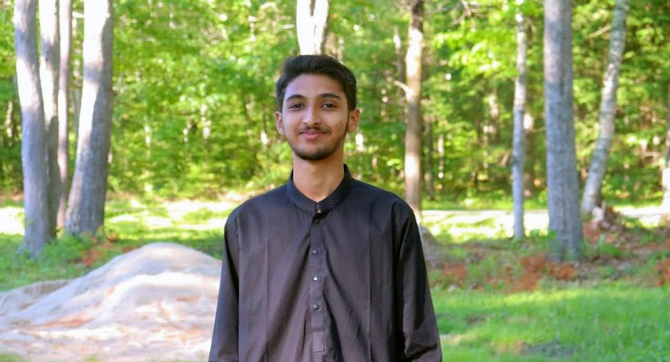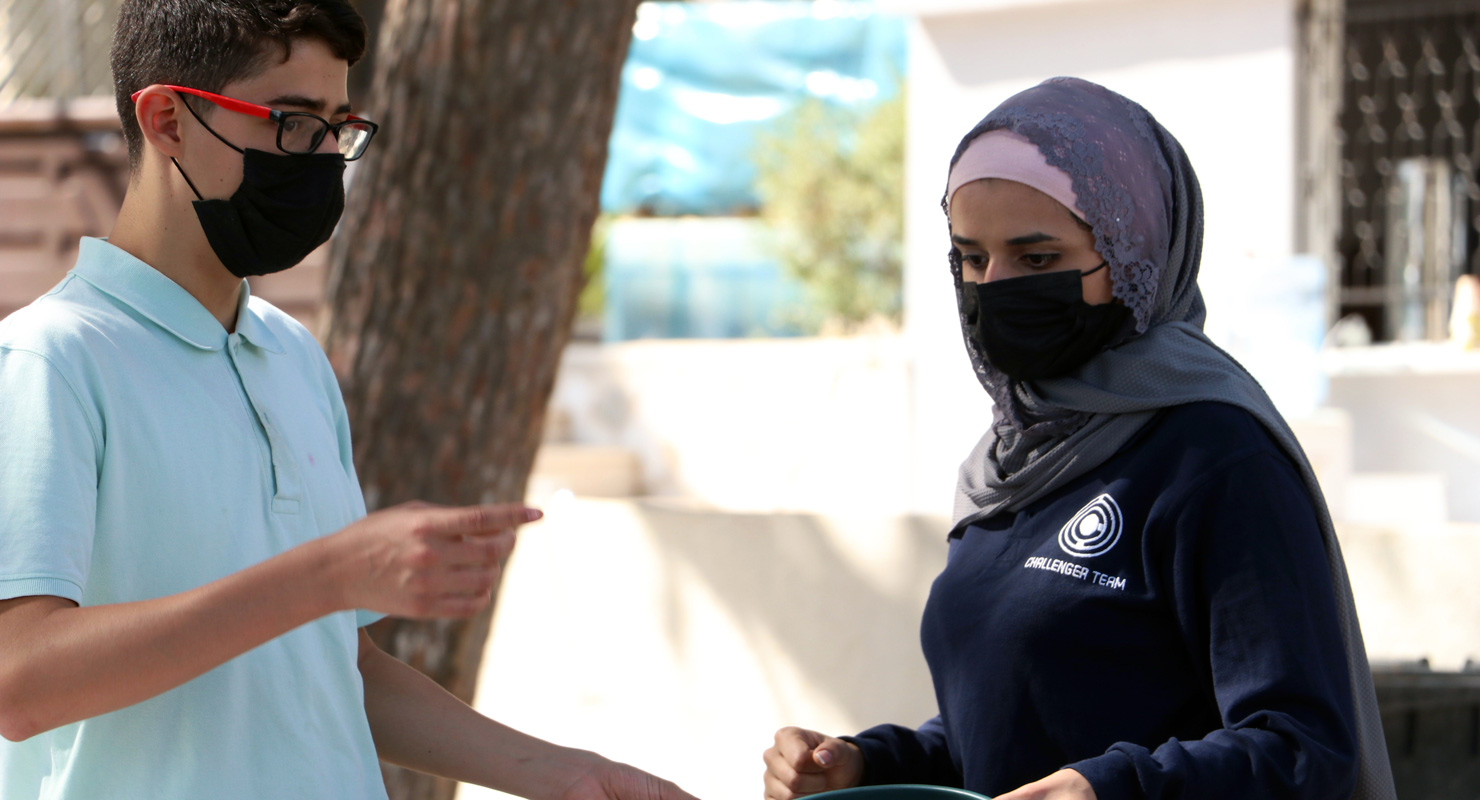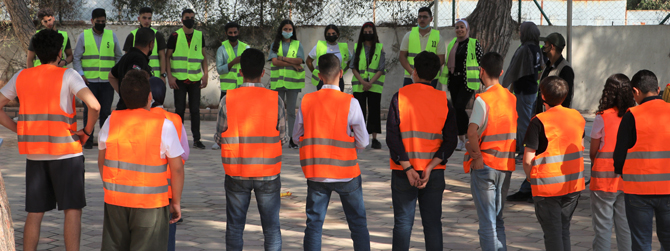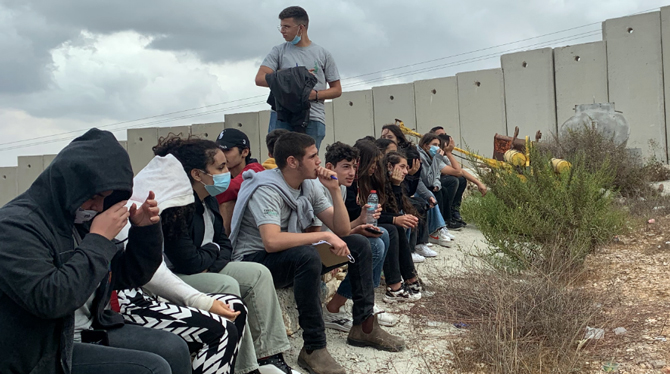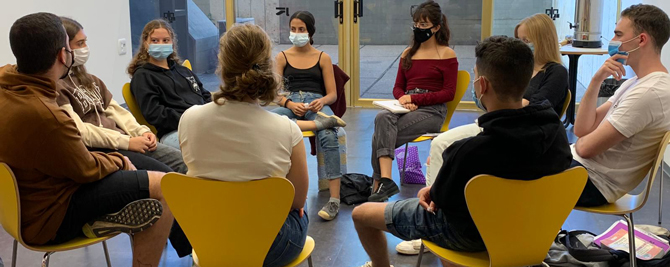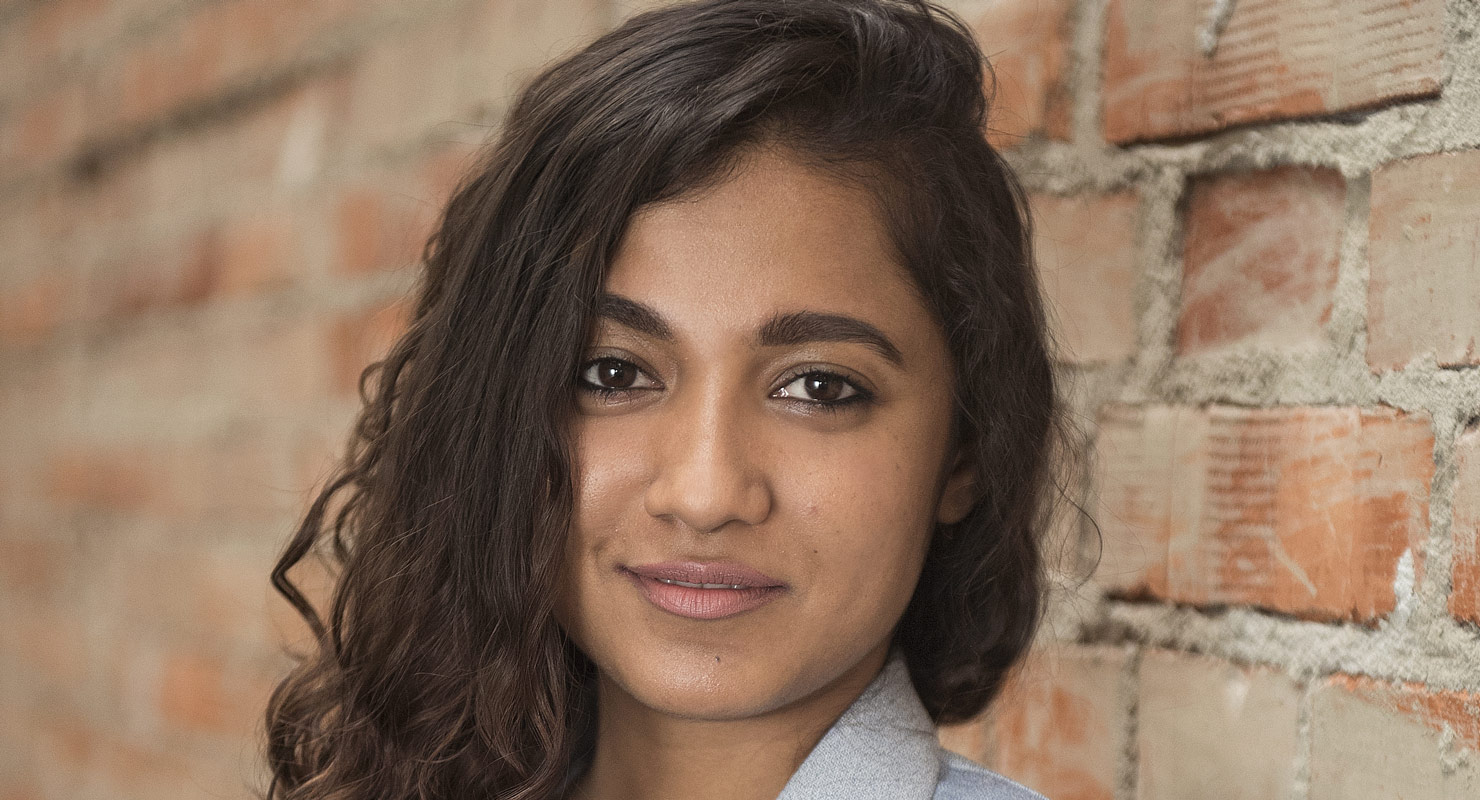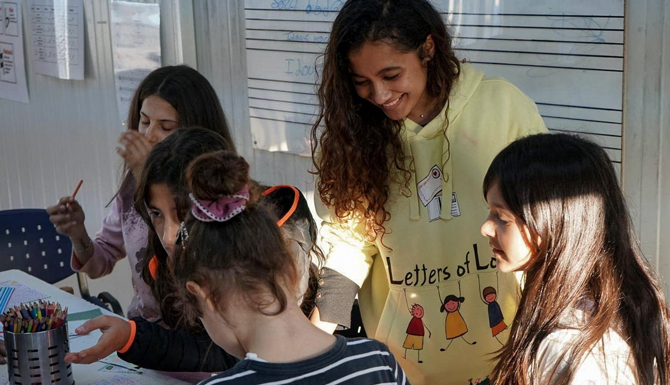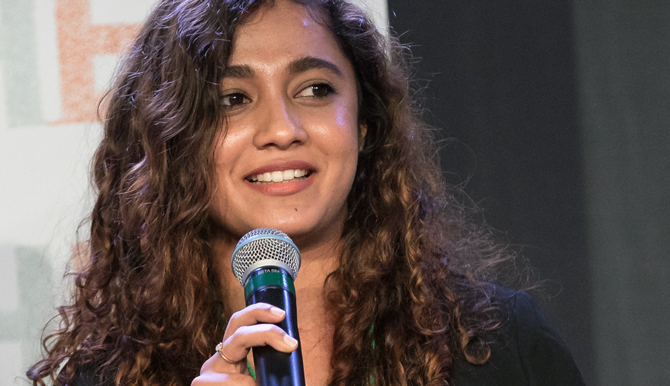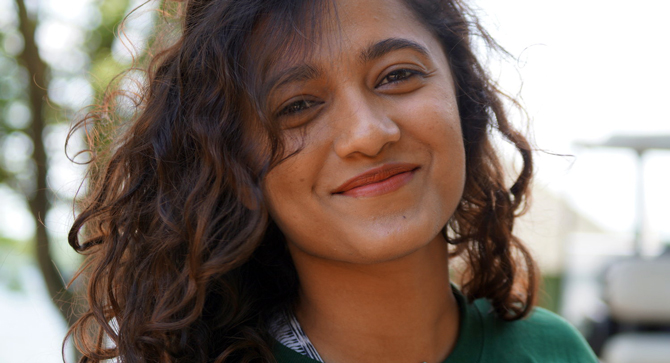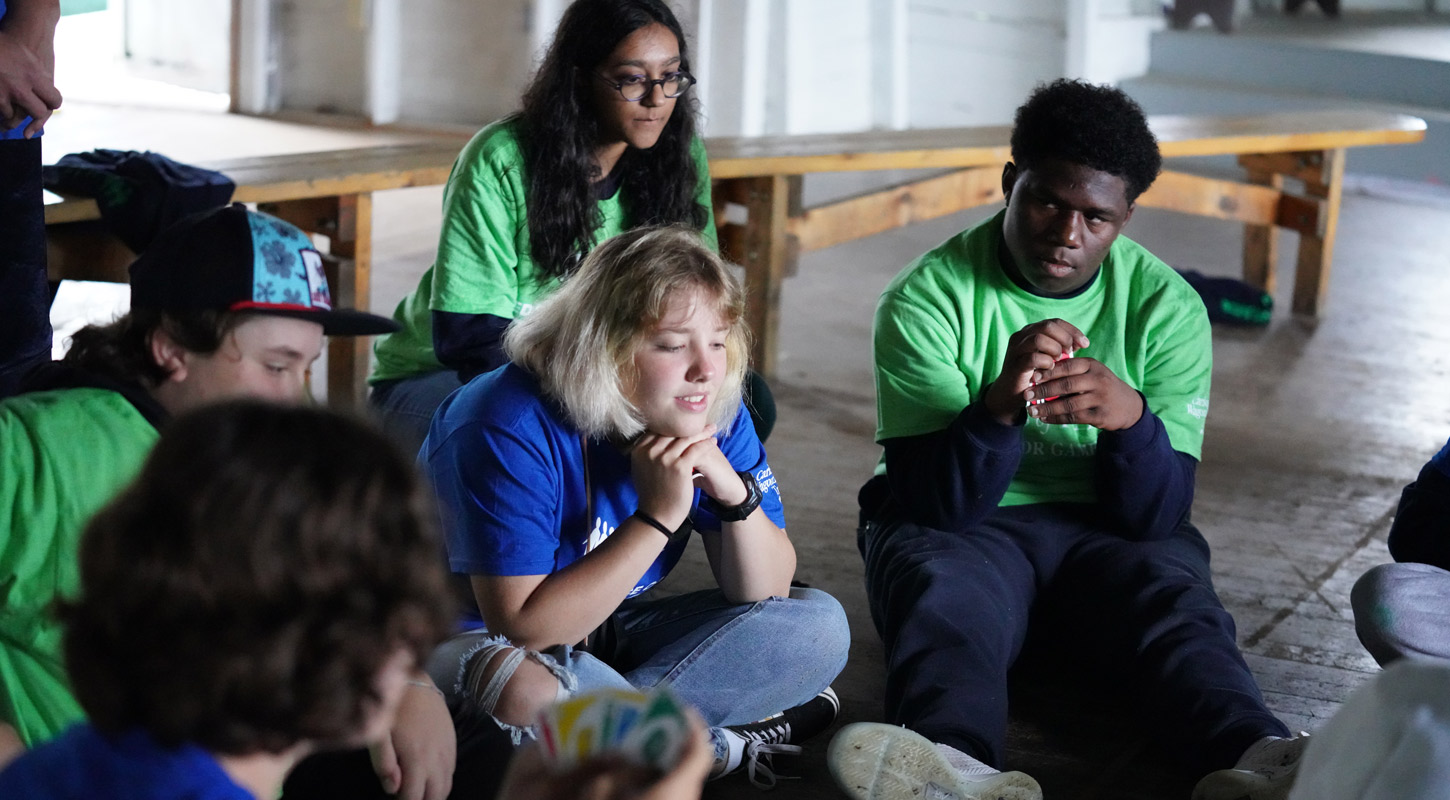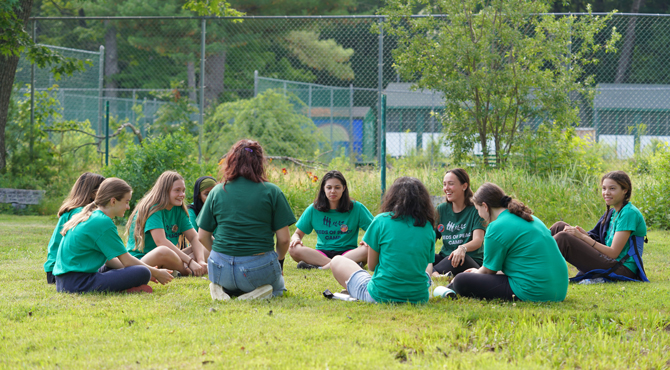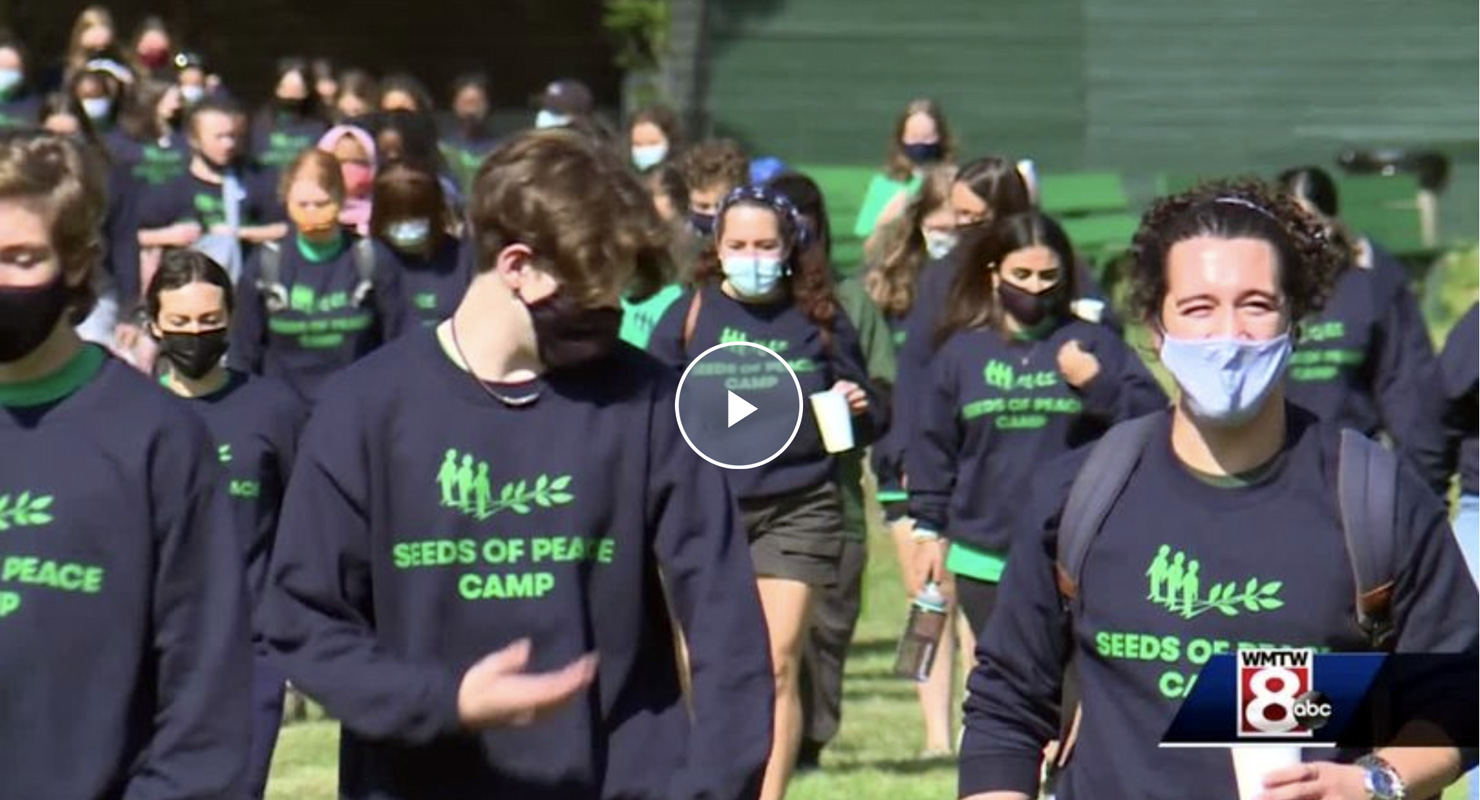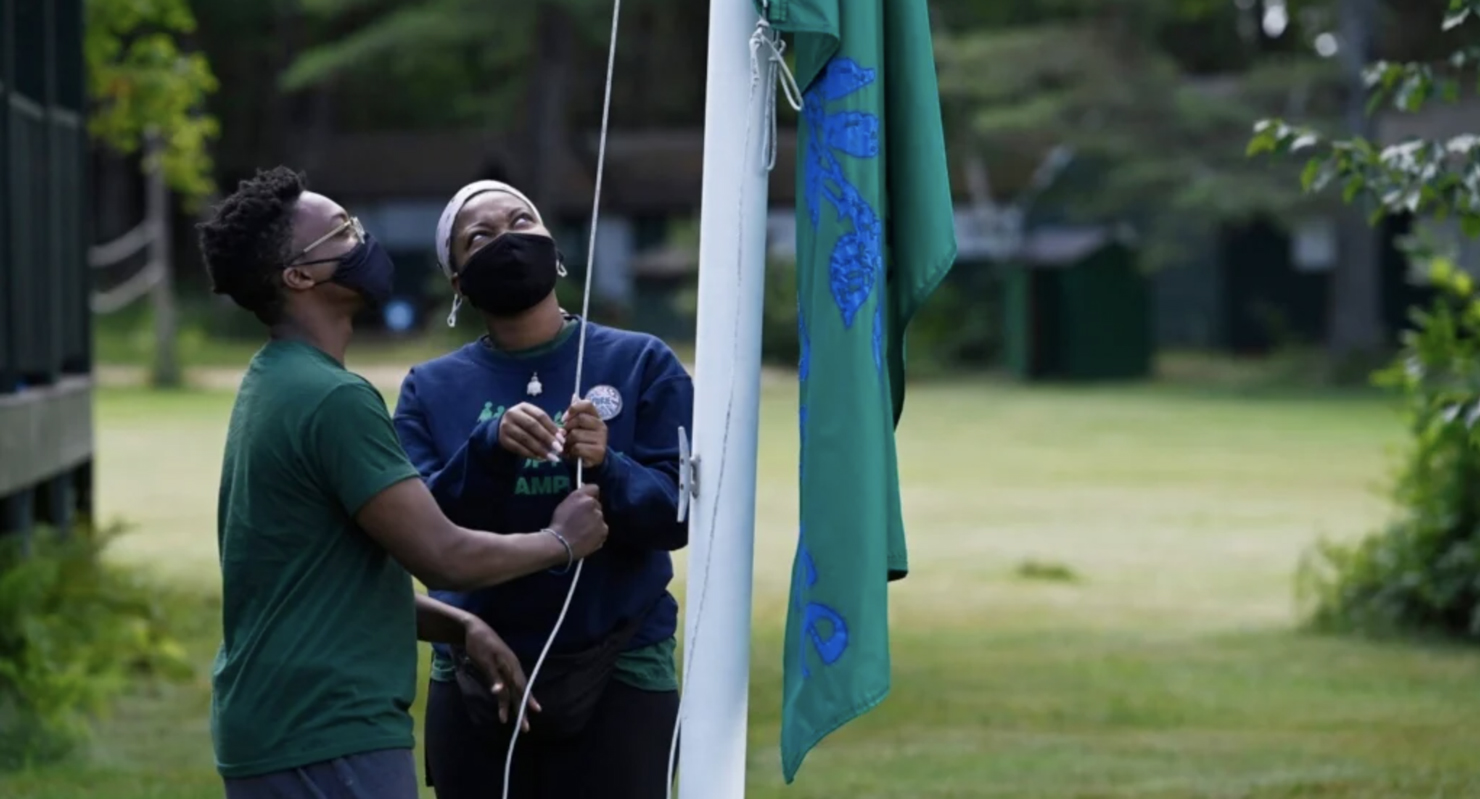Spark 2021 is a virtual celebration of the Seeds of Peace community highlighting individual sparks of hope, courage, and solidarity among all the communities in which we work.
How much good can one person do, how much love can one person spread, in the course of a lifetime? Saumya, a 2018 Indian Seed, is well on her way to finding out.
The 17-year-old said she calculated some time ago that she probably has around 3,900 weekends left on earth. The realization was a motivator, but also put much into perspective: What did she want to do with this precious time?
In many ways, she’s already done more than most. In the eighth grade she attended the Seeds of Peace Interfaith Camp in India, a choice that set her on a path to attending Camp in Maine in 2018, becoming a dialogue facilitator, and using a few of her favorite tools—particularly dialogue, art, dancing, and a lot of love—to becoming a champion of female empowerment and youth education.
“Through dialogue with Seeds of Peace, I began to see small things in the ways that women were treated, whether they had professional lives or worked from home. Seeing the hypocrisy inspired me to do something, and I started by going back to my roots.”
Thus was born Project Sachetna (birth or renewal in Hindi), a weeklong, in-person program that Saumya and her sister Sanmyukta (2019 Indian Seed) founded in 2018 for girls in the rural community where her father grew up. Using primarily dialogue and arts and crafts, they sought to bring a message of empowerment to girls who were only a few years younger than them.
“Most of the kids go to school for the free lunch, and most of the girls get married after 10th grade,” Saumya said. “There’s not much a future for them if they want something else, but we wanted to show them they did have a choice, and that their voices mattered.”
The program was scheduled for a week during the students’ vacation, and Saumya was told not to expect much in terms of attendance.
“The first few days started with around 20 girls, but the numbers kept increasing. They were showing up an hour early, and before long, boys began coming as well, intrigued by what the girls were learning. By the end of the week, the number had more than doubled,” Saumya said.
She has since been selected for a number of prestigious fellowships that allow youth to explore and express ideas around intersections of topics like feminism, equality, and leadership. Most recently, she was invited by Teach for India to participate in a project examining the repercussions of the pandemic on education in India. Organizing community dialogues, creating toolkits that countered misinformation, and even speaking on national television, she advocated for the millions of students—some 60 percent of children—without internet access who were suffering from a lack of education during the pandemic.
“These are not just statistics, there are actually humans behind them,” she told a newscaster. “If we can put resources into reopening restaurants and reopening bars, why are we not putting the same resources into re-opening our schools?”
While Saumya is motivated to make the most of her time on earth, she said her focus is on empowering others to make changes in their own lives and communities.
“I want to do remarkable work that sustains my soul, but it’s not about fame or money,” she said, “If I’m able to help out even one person, I’ll feel like this is a life well lived.”
What’s better than youth taking part in Seeds of Peace dialogue? When Seeds use their facilitation skills to create opportunities for more youth in their communities to do the same.
Not long after attending Seeds of Peace Camp in Maine, Samir, a 2019 Pakistan Seed, conceived the idea of a program that would allow opportunities for more youth to get a taste of the transformative power of dialogue that he had experienced.
“I honestly felt enlightened after my dialogue and felt that I had the power to change the world,” Samir said. “I still carry that power, and I am not ready to let go of it. I will pick myself up if I fall down, because if not me, then who’s gonna bring the change?”
Earlier this summer, with the support of 2018 Seed Ali Haris and the Wonder Y Academy (which Ali founded), Samir organized and hosted “Dialogue for Changemakers,” a six-day dialogue program for teenagers.
The in-person program took place at Titan College in Karachi and was completely student-run, including with several volunteers who participated in the Seeds of Peace 2021 Pakistani Youth Leadership and Dialogue Camp. Thirteen students (selected from a pool of 50 applicants) explored complex topics like religion, culture, nationality, and gender within Pakistani society while learning the fundamentals of dialogue in a supportive environment.
“You bond in a different way with your dialogue group because you speak your heart out without the fear of being judged,” Samir said. “That kind of comfort is not available for people
out there. So, I wanted this space to be a safe space for them and the people to be there for each other as support systems so they can hold each other in the tough times we find ourselves shackled in.”
It is especially during these challenging times, Samir said, that it is most important for youth to hear opposing viewpoints and learn from one another.
“Dialogue is an alien term to many Pakistanis,” said Hana Tariq, head of curriculum for Beyond the Classroom, which partners with Seeds of Peace to run local programs in Pakistan. “Seeing Seeds like Samir creating safe spaces for dialogue in the most meaningful way possible, is the change we wish and hope to see.”
With the launch of Israeli, Jordanian, and Palestinian Core Leadership Programs (CLP) in August, the fall has been about digging deeper: deepening youth’s understanding of their identities; their relationships to their communities and to one another; and their understanding of how to use tools like dialogue to grow as leaders who can make change locally and engage in impactful ways globally.
JORDAN
In Jordan, participants in the year-long RISE program met twice: On September 23, 36 youth attended “Islands of Sanity,” which aimed to create spaces for emerging young leaders to reclaim social sanity and push for solidarity across lines of difference amid deep divides and polarization in Jordan. And on Oct. 29, “To the East” brought together 32 youth for a workshop that included indoor rock climbing and focused on understanding social tensions using social constructionism theory, which tries to explain the intersectionality between identities, stereotypes, and exclusion.
In one exercise in September, youth were divided into eight groups and “dropped” on an imaginary deserted island. Tasked with choosing one item they would bring to sustain them until rescue crews arrived, Farah said a highlight came when three of the groups chose items that would help them establish new communities where justice and equality prevailed, rather than abandoning the island.
“I tend to think that at the heart of every leader is a desire to create a utopian paradise,” Farah said. “That is what our young leaders have in their hearts.”
PALESTINE
The Palestinian CLP, titled بصمة (or Bassmeh, which is Arabic for imprint or mark), held its second overnight seminar on Sept. 23-24. Focusing on systems of power, injustice, and privilege, the seminar allowed participants to discuss the concepts in a series of workshops, and then to see and discuss real-life examples of those concepts in a geo-political tour of Bethlehem.
On October 15, more than two dozen participants again met in the West Bank village of Battir for “Plant Palestine.” Working with a local villager, they learned agricultural techniques and local traditions associated with the olive harvest, as well as struggles the farmers and villagers face as a result of Israeli occupation and ongoing threats from Israeli settlers, including the burning of fields of vegetables and olive trees—a crop that is economically and symbolically significant to the Palestinian collective.
“We always say our roots are in the land—steadfast and resilient as the olive tree, which can endure even the most difficult challenges and still bear fruit,” said Antwan Saca, Director of Palestinian Programs. “With our youth coming from vastly different places across historical Palestine, it was a chance for them to give back to the community, to take responsibility and action, and to connect to a piece of their identity that they all share as Palestinians.”
ISRAEL
The Israeli Seeds of Peace programming team hit the highway in the month of October for a three-week dialogue road trip, traveling approximately 2,000 miles and facilitating some 60 hours of dialogue in the home communities of 2021 Israeli CLP participants.
The road trip, which includes meetings in the Haifa, Sharon, Tel Aviv, and Jerusalem Districts, as well as Ashqelon and the Southern regions, has both practical and symbolic value, said Jonathan Kabiri, Director of Israeli Programs and a 2011 Israeli Seed:
“We believe those conversation about the local context of the conflict are important to be had in their most safe and supportive place—where they live and among Seeds who are neighbors,” he said. “But it is also symbolic in that, rather than doing as in years past and sending them away to America as a first step in this journey, we are signaling to them that this can begin right here, right now in their communities, and we will even come to them to support that first step.”
Seeds of Peace Core Leadership Programs were launched in 2021 in Israel, Jordan, Pakistan, Palestine, and the U.S., each uniquely tailored to focus on the needs and challenges of the individual countries, while providing all participants with a common set of skills and language around dialogue and changemaking. From 2021 forward, these programs will be the entry point to Seeds of Peace programming for the majority of youth, and will prepare them for deeper engagement and multinational programs such as Camp. Learn more about our Middle East programs ››
An engineer turned educator with deep roots in the Seeds of Peace community, Pooja Pradeep is applying her experiences in mobilizing communities for good as the new International Director of GATHER, the action-taking branch of Seeds of Peace for adults.
“I see the power and potential of this community,” said Pooja, who was a 2018 GATHER Fellow, and founder of the nonprofit Letters of Love. “I want to be a part of creating an infrastructure that allows a citizenry of changemakers to do whatever they can, with whatever they have, wherever they are—in the most joyful ways possible.”
In many ways, the role is bringing experiences full circle for Pooja. Pooja has been an active and visible leader in the Seeds of Peace ecosystem since first working as a counselor at Camp in Maine in 2017. The following year she was selected as a GATHER Fellow—an experience that she said was pivotal in her professional and personal development, and a large part of what attracted her to this position.
“GATHER invested in me as a human being during a very difficult time in my life, and it made all the difference in becoming the leader that I am today,” she said. “This is an opportunity to pay that forward so others can have a pivotal experience as well.”
GATHER was created in 2015 to develop, support, and connect adult Seeds and changemakers working toward social, political, and economic change. As International Director, Pooja, who is based in Bangalore, will be responsible for connecting, mobilizing, and supporting the multinational GATHER network to take individual and collective action to build justice and peace.
With deep experience in the fields of arts for social impact, conflict transformation, and refugee and migrant empowerment, she is well suited for connecting changemakers within and outside of the current Seeds of Peace network.
“She is a masterful community builder,” said Eva Armour, Seeds of Peace Director of Impact, as can be seen in Pooja’s work through the Community Arts Network, Letters of Love, and her most recent efforts to create a COVID squad to respond to needs in India.
“Not only is the work impactful, but she centers and builds community along the way as a fundamental approach to social change,” Eva said. “Pooja is a force of energy who cares for people as fiercely as she fights for justice.”
Returning to Camp in Maine | Launching Core Leadership Program | Taking action in East Jerusalem through GATHER | Charting a new path for Jerusalem youth | Training Indian educators to facilitate student dialogue | Building a virtual community of young US leaders
OTISFIELD, MAINE | Over 130 youth from across the Northeast United States participated in the 2021 Seeds of Peace Camp, marking a much-anticipated return to the shores of Pleasant Lake in Maine after a two-year hiatus due to the pandemic.
And while it was a summer that was unprecedented in the nature of its obstacles, it also showed, now more than ever, the need to empower youth to work across lines of difference and lead change in their communities.
“We knew from early on that this summer would hold myriad challenges brought on by COVID-19,” said Sarah Stone, (a.k.a. Stoney) who served as Camp co-director alongside Spencer Traylor (2008 Maine Seed) and worked with a team of Camp leads hailing from across the Northeast.
“But youth and staff showed up ready to work across lines of difference with brilliance, compassion, and courage. There was so much beauty in their ability to share space and create a strong community rooted in care and in action, despite all the uncertainty and fear in the world right now.”
The summer kicked off in July with a two-and-a-half-week session for campers from across the Northeast U.S., followed by another session in August for only youth from Maine.
Closely monitoring ever-evolving CDC guidelines and following advice from public health consultants, a decision was made early in 2021 that only youth from within driving distance of Camp would be eligible this summer—meaning that for the first time in Seeds of Peace Camp history, there would be no international campers.
Instead, youth at Camp—and in all countries where Seeds of Peace works—began their Seeds journey by engaging in dialogue over issues within their own communities and countries, rather than focusing largely on cross-border conflicts.
For campers, it provided a much needed opportunity to discuss divides within the United States, with dialogue sessions tackling topics like religion, socioeconomic status, race, and political affiliation.
After a year full of political unrest, violence, and deepening societal divides, there was plenty for youth to dig into. But after a year that also wrought a heavy toll on mental health and greatly restricted opportunities for in-person social interaction, Camp staff also had to be mindful of when campers’ comfort zones might be overstretched.
“With so many schools hybrid or fully remote, youth’s social lives and interactions were mostly curated by themselves online and they hadn’t been re-accustomed to engaging with one another outside of this context,” Stoney said.
“At Camp, we did a lot of work to learn to see and hear one another not with the distance or wall of Facebook statuses or TikTok videos, but up close and personal, truly listening, unlearning, learning.”
The expectation for dialogue, of course, has always been that Seeds would apply those experiences to take action for change in their schools and communities. This year, however, a series of workshops that prepared students to do just that were baked into Camp programming. Initiated and designed by Stoney, Community Action challenged campers to work together to identify and prepare to address issues they want to change back home.
As Danielle Whyte, a 2019 Maine Seed and Co-Leader of Community Action, described it: “Community Action is the art of amplifying the voice of the collective.”
Grouped with campers from their hometowns, youth created action plans to bring anti-racist curricula to their schools, hire more diverse faculty and staff, and build school decision-making structures that are more inclusive of student voices, to name a few. For Cayen, a Seed from Maine, it was an opportunity to return home with “concrete, realistic” plans for change.
“I feel that Community Action allows me to be reassured, organized, inspired and ecstatic that my fellow peers and I have a solid chance at bringing positive and undeniable change in myself and my community,” Cayen reflected in a Camper Report. “Community Action provides a plan, a way to enact the plan, confidence that the plan will work, and a purpose.”
The focus on youth-led action underscored many of the summer’s new additions and highlights—from camper reports in which youth shared their first-hand perspectives, to youth-led special activities, to daily inspirations provided by a different bunk at each morning lineup.
Writing in one of the reports, Faysal, a camper from Maine, said he had come to “expect the unexpected” at Camp.
Whether it was trying a new activity for the first time or having the opportunity to branch out of their groups and meet new friends at Café Night, campers explored their capabilities and how these strengths might add to the greater good of their communities.
“Seeds of Peace is an opportunity for you to find yourself in a place where you can be yourself,” Faysal wrote. “There needs to be change in the world, and here is where that starts.”
OTISFIELD, Maine | The second session of the summer is underway at Seeds of Peace Camp in Otisfield. Due to the pandemic, the camp is not able to welcome the normal international campers from areas of conflict.
For the first time, this session is all students from Maine.
The camp was originally created to bring together teenagers from Israel and Palestine and help them find common ground. The programs have expanded to include other areas over the years.
This summer, Maine teens are getting the chance to explore their own divisions. Lead counselor and Maine high school graduate Danielle Whyte said she hopes this will help end hatred and violence within Maine communities.
By Gillian Graham
OTISFIELD | On their first morning of camp, 70 teenagers wearing matching blue and green Seeds of Peace sweatshirts gathered on the field where more than 7,000 campers before them have come from across the globe to talk about deep divides and how to find common ground.
But this summer, for the first time in its 28-year history, the camp is devoting a session exclusively to teens from Maine.
Originally created to bring together Palestinian and Israeli teenagers to seek common ground, Seeds of Peace has expanded over the years to include other Middle Eastern countries and teenagers from the United States. But the pandemic kept the camp in Otisfield closed last year, and it’s still not possible for international students to travel to Maine because of COVID travel restrictions.
Campers and counselors at Seeds of Peace approach the field for opening ceremonies on Monday. Campers will explore the deep divides in American society, including race, religion and political differences, while developing the skills and confidence to address conflicts in their own schools and communities. Shawn Patrick Ouellette/Staff Photographer
“They come from across the state, from urban and rural areas, and a variety of backgrounds. We have New Mainers and people whose families have been here for generations,” said Josh Thomas, the executive director. “We’re bringing young leaders together across deep divides. This a chance to have the conversations that are hard to have in everyday life.”


